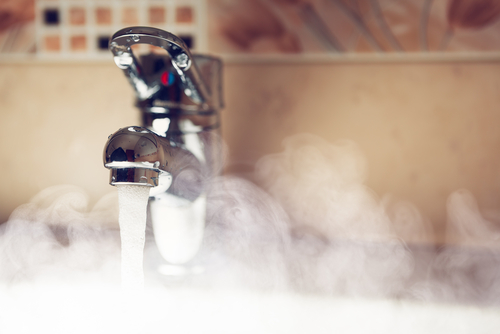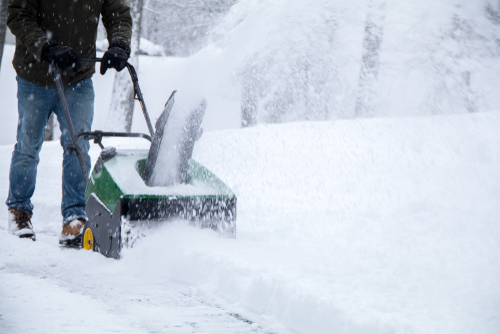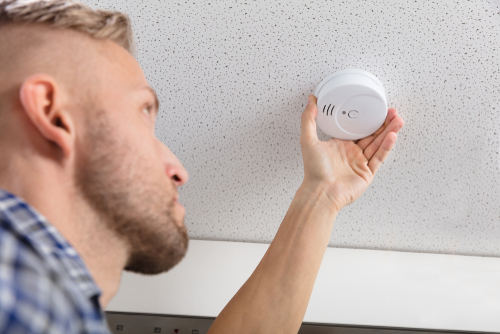

It’s been wicked cold recently here in Rhode Island and southeastern Massachusetts. Your home’s furnace or boiler has been working hard to keep your home warm and comfortable.
That hard work can drive up your energy costs and create more wear and tear on your heating system.
You can make things easier for your heating system now and for winters to come with these five ideas that keep the heat your furnace or boiler creates in your home.
Did you know that drafts around windows and exterior doors, and through exterior walls, can cause heat loss that is the equivalent of leaving a window open? Brrrr!
There are ways to combat these drafts that don’t take a lot of time or money but can reduce your heating costs by up to 10%. Caulk, weatherstripping, doorstops, expanding foam, and plastic window coverings are all at your local home improvement store. A few hours’ time can not only cut heating costs but make you more comfortable without the chill from those drafts.
Our area has a lot of older homes. And many of those older homes do not have enough insulation. Inadequate insulation allows heat to escape your home more easily. The United States Department of Energy provides guidelines for how much insulation your home should have, and information about the types of insulation available.
Homes in New England often have hardwood floors. They’re gorgeous, but they’re also pretty cold during winter. Laying down area rugs can prevent heat from escaping and make walking around more comfy.
As we mentioned earlier, drafts around windows are a major cause of heat loss in your home. Instead of lightweight cotton curtains, use heavier insulated draperies and curtains, window quilts, and insulated cellular shades. These can cut heat loss in a room by up to 10%. Attach the drapes to the wall with magnetic tape or Velcro, and you can cut heat loss by up to 25%!
While it may be cold outside on sunny days, you can use the sun to your advantage when it comes to keeping your home warm. Open curtains and blinds on windows that get direct sunlight during the day. The natural heating will warm up your home, giving your heating system a break. Remember to close the blinds and curtains when the sun goes down to keep that heat in.
Contact Wesco Oil to maintain, repair, or upgrade your home heating system!
 It’s been pretty frigid here in Rhode Island and southeastern Massachusetts.
It’s been pretty frigid here in Rhode Island and southeastern Massachusetts.
If you use heating oil to keep your home warm and have an outdoor heating oil tank, you may be wondering if heating oil can freeze.
Heating oil does begin to freeze at 16˚ Fahrenheit. But it does not freeze the same way that water does. It doesn’t become solid, like ice. Instead, heating oil thickens until it’s a waxy sludge. This condition is usually referred to as gelling.
That gelling presents some serious problems for your heating oil tank, your heating system, and your home.
Gelled oil is heavier than heating oil that has not gelled. So it sinks to the bottom of your heating oil tank. As more oil gels, the less burnable oil you have.
When gelled oil is pumped through the heating oil lines from the tank to your furnace or boiler, it builds up on the walls of those lines, reducing the flow of heating oil to your heating system. That lowers your heating system’s efficiency.
That clogging eventually reaches the atomizing nozzle, which turns your heating oil into a vapor so it can be burned. Less oil that can be converted to heat gets through. The gelled oil can also clog your heating oil filter.
Before we discuss preventative measures, we have to cover safety. NEVER tamper with your heating system equipment, heating oil tank, or heating oil. Leave this to trained, experienced professionals like the service technicians at Wesco Oil.
Here are some ways to stop gelling before it starts.
Have your heating system professionally maintained. This helps your heating system run at peak efficiency and gives our technicians an opportunity to spot any problems created by previous gelling incidents.
Cover your heating oil tank. Build a shed around it to protect it against the elements and shield it from cold winds.
Bury your heating oil line. If the line from your heating oil tank into your home is aboveground, it’s more vulnerable to the cold and helping the heating oil to gel. Burying it provides a natural insulation.
Install a wider fuel line. A wider fuel line reduces the amount of blockage from gelling.
Wesco Oil is the local leader for reliable heating oil delivery. Become a customer today!
 Winter is a demanding time for your home’s water heater.
Winter is a demanding time for your home’s water heater.
First, the water coming into it, whether it comes from a well or the public water supply, is colder.
Your water heater has to work harder to heat the water to your set temperature.
Second, water heaters with a tank have more standing heat loss in the winter. Standing heat loss happens when a water heater is in an unheated space like a basement. Because it’s colder there, the water sitting in your tank loses heat faster. The heating and reheating needed to keep the water hot makes more work for your water heater.
Third, we’re using more hot water. We linger a little longer in hot showers. With kids home over holiday breaks, more hot water is needed for bathing, laundry, and dishwashing, putting more demands on your water heater.
It is recommended that you have your home’s water heater get a professional maintenance tune-up at least once every two years. The trained, experienced service technicians at Wesco Oil can do that for you.
But there are things you should do in-between those tune-ups so your water heater runs more efficiently, with less risk of a breakdown, and a longer life expectancy.
Corrosion is a major cause of water heater tank failure. Sediment at the bottom of your water heater tank can cause corrosion. It also makes it more difficult for the system to heat the water, making it less efficient and driving up your energy costs.
Flushing the tank is easy. Here’s how to do it.
The anode rod draws the minerals that cause corrosion to itself rather than the tank lining, helping to protect your tank from corrosion. It is often called the “sacrificial rod.”
Anode rods last about five years. Once your anode rod is depleted, your tank is vulnerable to corrosion and tank failure. Checking your anode rod takes a few minutes. Read your water heater owner’s manual for instructions.
An insulating blanket on your water heater tank and around pipes helps reduce standing heat loss. The water heater won’t have to run as often or as long to keep your water hot, reducing wear and energy usage.
Need water heater service? Get in touch with us!
 Heating oil is the best fuel for getting your home warm fast and keeping it warm.
Heating oil is the best fuel for getting your home warm fast and keeping it warm.
But to enjoy those benefits, you need your heating oil delivered reliably and promptly. Fortunately, you can get that with Wesco Oil!
However, there is something you need to do to make that happen: always make sure we can safely access your home’s heating oil tank.
After each snowfall, you need to clear your driveway and the path to your home’s heating oil tank. If our delivery trucks cannot safely get down your driveway or to your heating oil tank, we won’t be able to deliver your heating oil.
Your driveway needs to be cleared wide enough for our trucks to get in, so clear your driveway to a width of about 10 feet. Mark the edges of your driveway. There also needs to be clear, safe path at least a foot wide from the driveway to your heating oil tank. You need to mark your tank’s location with a pole topped with a bright-colored flag or wide ribbon. The pole needs to be tall enough to be seen over heavy, piled, or drifted snow.
If a winter storm is in the forecast, check your heating oil tank gauge level to make sure you have enough heating oil to get through the storm and several days after. If it’s near or below 25%, call us right away to request a delivery. You can avoid this worry by doing what’s suggested next.
Our Automatic Delivery lets us track your heating oil usage and schedule a delivery to your home, so you have peace of mind that you’ll always have enough heating oil.
Look closely to make sure that it is stable on its base and that the legs are all strong and sturdy. Check for signs of corrosion like condensation on the outside of the tank and pinhole leaks. If there are any issues, contact us right away.
Get dependable heating oil delivery. Become a Wesco Oil customer today!
 Usually, your home’s furnace is background noise in your home when it’s running.
Usually, your home’s furnace is background noise in your home when it’s running.
But when it’s not, and it’s making a noise (or noises) that get your attention, that may be a warning sign that you need to heed.
Here are some sounds that you might hear, and what you should do if you do hear them.
If you do need professional attention for your furnace, the trained, experienced service technicians at Wesco Oil are here for you!
Understandably, this sound coming from your furnace can be frightening. There are two common possibilities. One is if you hear the sounds consistently, not only when the furnace kicks on. There may be an issue with either the air ducts or the metal siding of the furnace expanding and contracting.
But if you are only hearing a boom or bang when your furnace cycles on, that’s a problem. It may be a dirty furnace burner, which can in time damage the heat exchanger. That may cause a carbon monoxide leak into your home. DO NOT try to clean the burner yourself. You may damage it further. This is a job for professionals.
There aren’t many more cringeworthy sounds than metal-on-metal scraping. And it is a sound you should not ignore when it comes to your furnace. The most common cause of this noise is that the blower fan has come loose from its mount. The noise is caused by the blower fan scraping the bearings. When this happens, the blower fan slows down. The furnace may overheat and shut down too soon, leaving your home colder than you want.
Do not ignore this sound. It may be caused by a broken heat exchanger thanks to lack or airflow from a blower fan problems or a dirty filter. That excess heat can crack or break the heat exchanger. That damage can create a carbon monoxide leak. Contact us immediately to check this out and fix it.
Those squealing sounds can either be a worn-down blower fan belt or a lack of lubrication of your furnace’s parts. Don’t dawdle on this one, as this can lead to the blower fan failing and your furnace shutting down. Contact us and we’ll take care of it.
Contact Wesco Oil for expert maintenance and repair of your home’s heating system!
 The holidays are upon us. And even though many of us are scaling back our plans for travel, shopping, and entertaining, there are still things to do and buy.
The holidays are upon us. And even though many of us are scaling back our plans for travel, shopping, and entertaining, there are still things to do and buy.
You can do and buy more when you save on your home’s heating costs.
We’ve put together three tips you can use to reduce your heating costs while not giving up one bit of warmth and comfort.
Yes, winter has arrived. But it’s not too late to make sure your home’s furnace or boiler is ready for it!
If you haven’t already had your heating system get its annual tune-up, now is the time to do so. Wesco Oil’s trained, experienced service technicians will make sure that your furnace or boiler is running at its peak efficiency, meaning it will use the least possible amount of energy to keep your home warm. An annual tune-up also lets them spot and fix problems before they become worse and reduce your heating system’s efficiency, driving up your heating costs.
Programmable and smart thermostats can be great tools for lowering your heating costs. But you have to program them properly. If you do, you can cut your heating costs by up to 10%! By the way, heating accounts for about half your energy costs in winter, so cutting your heating costs that much can lead to big savings.
Here’s what to do:
It may be cold outside, but the sun can still provide free heat for your home! Leave your curtains and blinds open during the day to take advantage of solar heating. Your heating system will cycle on less frequently, saving you on heating costs. Don’t forget to close your curtains and blinds when the sun goes down to keep all that heat you brought in inside your home, so your furnace or boiler won’t have to work as much at night, either.
Want reliable heating oil delivery? Become a Wesco Oil customer today!
Wesco Oil can help keep your heating system in tip-top shape. Contact us to schedule your annual maintenance tune-up!

It’s an awful feeling when you go to turn on the heat in your home on a cold winter’s day (or night) and nothing happens.
You’re getting uncomfortably cold. You may worry about pipes freezing and bursting.
The normal reaction would be to contact Wesco Oil to deal with this no-heat emergency. We provide 24/7 emergency no-heat service.
By the way, if you do have a no-heat emergency, DO NOT email us or use our online contact form. If you live in Rhode Island, call us at 401-231-3681. If you live in Massachusetts, call us at 508-883-9100.
But before you pick up the phone, do a few troubleshooting tasks. You may be able to get the heat back on yourself without the wait, worry, and expense of a service call.
Here’s what to do.
Check your thermostat. Is it set to at least 5˚ higher than your current room temperature? Is the thermostat set to “heat?” Are the batteries still good (install new batteries to check)? If the answer to all of those is “yes,” move on to the next step.
Check your heating system switch. Is it set to “ON?” It should be. If it is, do the next troubleshoot.
Check your oil tank. Is your tank at least 1/8 full? If it isn’t, call us immediately for an emergency heating oil delivery. If it is, on to the next step.
Check the circuit breaker. It may have tripped. Turn the switch for the heating system back on if it was tripped. If it wasn’t tripped, move on to the next troubleshoot.
Check the air filter. If you have a furnace, the air filter may be clogged, which causes the heating system to shut down. Change it if needed. If not, go on to the final step.
Check the boiler. If you have a steam boiler, check the water level in the gauge glass. It should be at least half-full. If it isn’t, call us. If it is, move on to the final step. If you have a hot water boiler, go to the final step.
Push and hold the reset button for 30 seconds. Only do this ONCE. If you do it more than once, too much heating will get pumped into the combustion chamber, causing it to flood. Then you’re definitely calling us because that’s a big (and costly) repair.
None of these worked? Call us right away.
Contact us any time if you have a no-heat emergency!
 With the coming winter also comes the increase in carbon monoxide poisonings.
With the coming winter also comes the increase in carbon monoxide poisonings.
That’s because we’re indoors most of the time, with the windows closed, and using our home heating systems.
Your home’s furnace or boiler can leak carbon monoxide (CO), creating a danger for you and your loved ones. CO poisoning is often called a silent killer, as it is colorless and odorless, and often occurs when people are asleep.
Read on to learn more about CO poisoning, and how to prevent your heating system from creating CO leaks.
According to the Centers for Disease Control, about 430 people die from carbon monoxide (CO) poisoning, and about 50,000 end up in the emergency room, each year.
But that’s only the beginning of the damage caused by carbon monoxide. Even if someone survives CO poisoning, the long-term effects can be devastating, as vital organs like the heart, lungs, and brain are starved of oxygen by carbon monoxide. Pregnant women are not only more vulnerable to CO poisoning themselves, but there is also a risk of miscarriage, stillbirth, or other fetal injuries.
The symptoms of CO poisoning are often described as “flu-like” and include:
Carbon monoxide is a normal part of the combustion process inside your heating system. If your heating system is functioning properly, that CO is contained within the heat exchanger, then sent through the flue exhaust vent which vents it safely out of your home.
The most common cause of heating system-related carbon monoxide leaks are cracks in the heat exchanger or flue exhaust vent. Another cause may be dirty components of the heating system, like a filter.
Your first and most essential task is to install carbon monoxide detectors on every level of your home (that includes the basement) as well as outside of all sleeping areas.
Take care of your CO detectors, testing them twice a year when you change the time on your clocks, and changing the batteries as needed (at least once a year). CO detectors need to be replaced every five years.
If you have natural gas in your home, we strongly recommend that you get a gas leak detector.
Prevent carbon monoxide leaks from your heating system with regular, professional maintenance tune-ups done by the trained, knowledgeable service technicians at Wesco Oil.
Contact us to schedule your annual heating system tune-up to keep your heating system running safely and efficiently!

There are online how-to video tutorials for everything under the sun.
Want to learn how to use photo editing software to restore old family photos? Make a winged effect with eyeliner? Take down wallpaper? Tie a Windsor knot? Bake the perfect batch of brownies? You’ll find a video teaching you how.
But there are some things you can’t learn by watching videos. One of them is performing a maintenance tune-up of your home’s furnace or boiler.
You may think this is a great way to save a few dollars while taking care of your home.
Spoiler alert: It’s not.
Here are three reasons why heating system maintenance should be left to trained professionals like the service technicians at Wesco Oil.
Your home’s furnace or boiler is a complex system that has several different components and moving parts. If you make mistakes while attempting to perform maintenance, you can instead create damage that can lead to fires and a buildup of carbon monoxide.
If carbon monoxide builds up in the blood, the oxygen in the red blood cells is replaced by carbon monoxide. If that happens, the brain, heart and lungs are deprived of the oxygen they need to function. Because carbon monoxide is colorless and has no odor, it’s undetectable, which is what makes it so dangerous. Carbon monoxide poisoning can cause serious injury or death to you, your family, and your pets.
Technology has made today’s furnaces and boilers more efficient and durable, but also more complex.
You aren’t going to get the skills and know-how needed to properly and safely perform a maintenance tune-up on your heating systems by watching how-to videos. Also, you need specialized tools that you can’t get at the local hardware store.
If you’re looking to save money by making your heating system tune-up a DIY project, you’re making what could be a very costly mistake. You do this wrong and damage your furnace or boiler, you could end up paying much more than what you would have for a tune-up.
How much more? Here are some national average costs to give you an idea:
Furnace repair: $295
Boiler repair: $379
Furnace replacement: $4,427
Boiler replacement: $5,851
As we said, these figures are national averages. The costs here in Rhode Island and southeastern Massachusetts could be much higher.
Have you checked the warranty for your furnace or boiler? It probably requires that there be documentation of regular, professional maintenance to keep the warranty valid.
By trying to perform a tune-up yourself, you could be violating the warranty, which can cost you big in the long run if you ever need to use that warranty and find out it’s no longer in effect.
Instead of risking all of this, trust the service technicians at Wesco Oil to take good care of your furnace or boiler. Our service technicians have the training, experience, and knowledge to not only tune-up your furnace or boiler, but thoroughly inspect it while doing so and fix any problems before they become bigger, more expensive repair jobs.
Protect your home, your loved ones, and your heating system with proper professional maintenance from the service technicians at Wesco Oil. Contact us today to schedule your tune-up.

With the coming winter, you may be looking at your current furnace and wondering if it will get through this coming winter without breaking down or driving your energy costs through the roof with reduced efficiency.
If that’s the case, now is the time to contact Wesco Oil about installing a new furnace. We sell only top-quality home heating equipment from respected brands such as Weil McLain, Williamson, and Pensotti.
Our equipment experts have the knowledge and experience so you can be assured that you’ll have the right furnace for your home.
There are several factors that affect the purchase and installation of your new furnace. We’ve put together four of them, so you are better informed as you begin shopping for your new furnace.
Furnaces come in many sizes. You have to make sure that the furnace you purchase has the will be able to meet your home’s heating needs. One that is too big or too small when it comes to your home’s heating load will affect its efficiency and could drive up your energy costs. Make sure any estimates you get compare furnaces with similar Btu output.
You can significantly reduce the cost of your new furnace by taking advantage of manufacturer’s specials or incentives and rebates from organizations such as Oil Heat Institute of Rhode Island and Mass Saves. Wesco’s equipment experts will make sure you get any specials, incentives, or rebates your new furnace qualifies fore.
Will ductwork installation, repair, or replacement be a part of installing your new furnace? Make sure those costs are factored in when you get an estimate. That also affect how long the project could take, so you need to factor that into scheduling the installation. Something else that can affect the installation is any special features you’re adding, such as zoned heating or indoor air quality equipment like a whole-house humidifier or dehumidifier, or air cleaning.
We’ve installed a lot of furnaces over the years. And one thing we’ve learned is that no two installations are exactly alike. There are many factors that can affect how the installation is done, how long it takes, and how much it costs. Those factors include:
We’ll discuss all of this thoroughly with you ahead of installation, so you have no surprises.
Need a new furnace? Come to Wesco Oil for sales, installation, and service of top-quality furnaces. Get in touch with us today to get started!